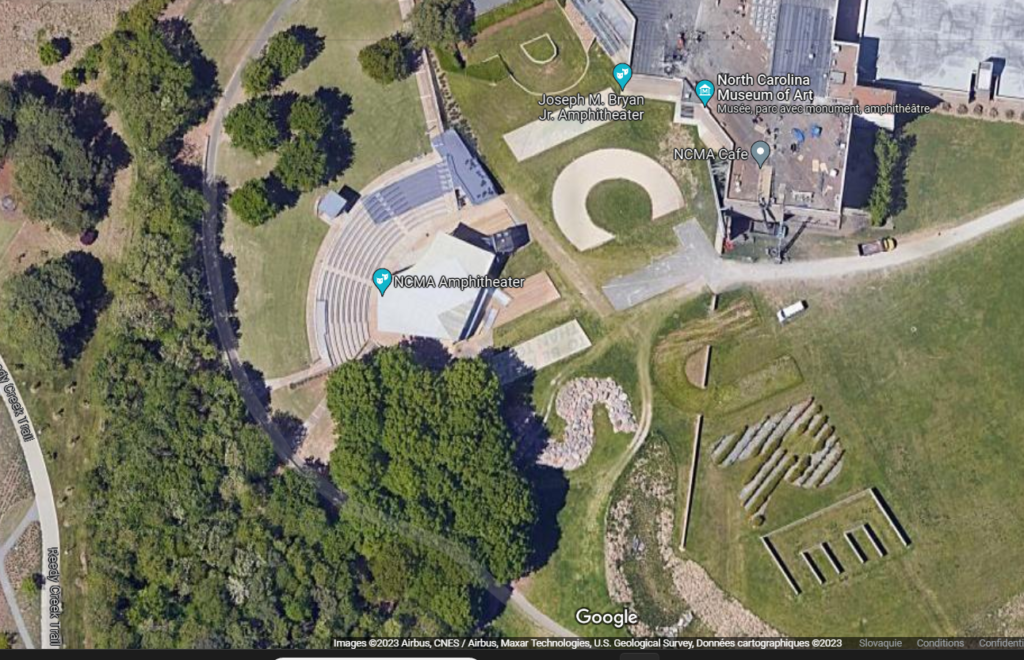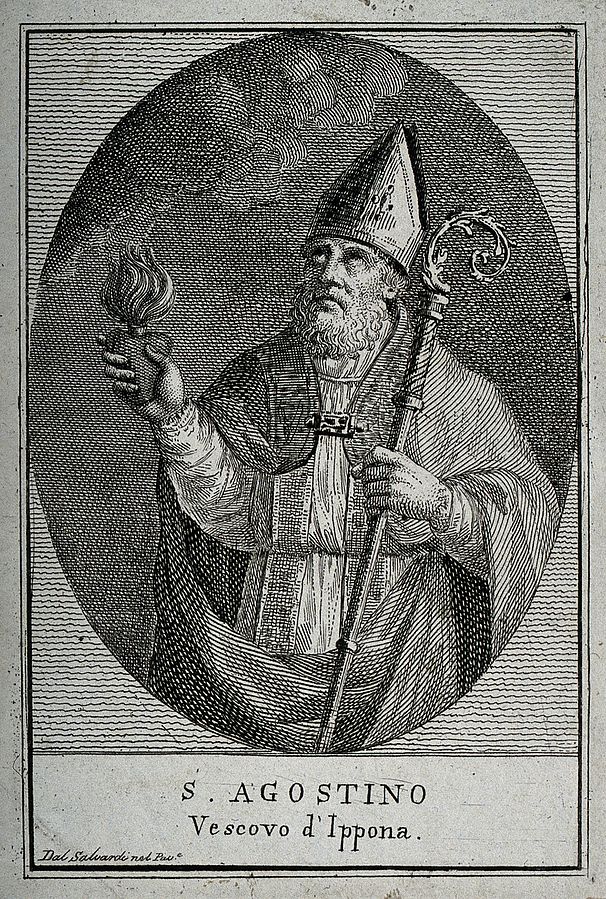At the North Carolina Museum of Art in Raleigh, there is an amazing sculpture that can only be appreciated from the sky. You can see it, when you look up the Museum on Google Maps:

“PICTURE THIS!” the sculpture says – a message for birds, for God, for the Maps Staff. On the ground, on the E in “Picture This” even looks like a sculpture. The rest is just so organically a part of the world that you would never notice it if you weren’t looking.
Maybe that’s what the City of God is like for Augustine: something that is present and beautiful, but invisible unless you really know what you’re looking for. Now, on this blog we have already looked at Augustine’s perspective on God’s providential care through our lives. This post gives a little more of an overview as to who Augustine is and what we can say about his perspective of our lives on Earth.
Augustine (d.430), the African bishop and intellectual, is probably the most influential Church Father in the Latin West. He was born and served most of his ministry in what is now Algeria, and is famous for the clever and complex ways he wrestled with issues like the problem of evil, human free will, Christian appropriation of non-Christian knowledge, and the interpretation of Scripture. In antiquity, his most famous work was probably his Literal Interpretation of Genesis, but today he is most well-known for his sort-of-autobiography, Confessions.

https://wellcomeimages.org/indexplus/obf_images/2e/54/6d72b86305ff09f7b3b0b75940cd.jpg
Augustine was a prolific writer, and his magnum opus, City of God (c.426?), is a 22-book defense of Christianity against polytheist claims that the Sack of Rome (410) was punishment for the cessation of traditional Roman worship.
In the midst of chaos and confusion, Augustine pleads for his readers to recognize that there are two cities (even when only one is visible). As he describes most clearly in Book XI, there is the vain City of Man and the Invisible City of God. The City of God is founded by the Lord of Lords, who ignites in our hearts a desire for citizenship in that heavenly city. This is in contrast to those citizens of the earthly city, who mostly seek after their own goods (and gods) and covet worldly power, privileges, and wealth. These two cities were originally created by the separation of the angels, those who are good are citizens of the City of God, those who are fallen are citizens of the City of Man. Human beings are so besotted and disabled by our sins that we require a mediator, Christ, to know which way is best for us. As Augustine discusses in Book XIX, philosophers have tried to understand the supreme Good, and to make themselves happy, but have failed because happiness is impossible in the City of Man.
On the one hand, we the Church are already members of this heavenly city. But on the other hand, we are not there yet: we live in this world, which is full of sorrow, suffering, pain, and temptation. Even for the saints, like is a constant battle between virtue and vice. We are present in this world as strangers and sojourners, far from our true home heaven. The destiny of the City of Man, as Augustine writes in Enchiridion XXIX.12, is “exile from the City of God.” The torment promised, in Augustine’s vision, is absence: estrangement from God’s blessing, the greatest loss imaginable.
This begs the question of why we are on Earth at all. On the one hand, Augustine in City of God XIX.10 that true virtue can make good use of all things, and can even make use of the evils we suffer. Our end, our purpose, is God. But…why are we alive at all? Why be born? Why live now, even as members of the invisible City of God, as sojourners among the City of Man?
Certainly not for touristic purposes!
No, Augustine’s answer is…
Beauty!
Things weren’t supposed to be filled with evil and darkness. Originally, we could have sinned or not, and were immortal in the sense that we could have not died. However, even danger, disorder, and suffering is beautiful. Augustine explains further in On True Religion XL.76: everything is ordered so that it can ensure the beauty of the cosmos, and even the things we hate most now would give us pleasure if we, like God, could see the entire, lovely structure. “The very reason,” Augustine says, “why some things are inferior is that through the parts may be imperfect the whole is perfect, whether its beauty is seen stationary or in movement.”[1] The contrast is important, he states that “the colour black in a picture may well be beautiful if you take the picture as a whole. So the entire contest of human life is fittingly conducted by the unchanging providence of God” who finds the whole thing beautiful.
So why are we here?
…For our aesthetic contribution to the universe…
For Augustine, even those things in our lives that are unbearable, repulsive, abhorrent, somehow on the long view, contribute to something lovely because it makes a contrastive harmony. The City of Man, with all its odious things, provides a foil to highlight the beauty of the City of God.
Not everyone has found this answer satisfying, and Augustine certainly has his critics. For Augustine, even the garden of Eden contained violence – in fact, violence is an unproblematic part of the natural world, which was always red in tooth and claw. Violence is not necessarily evil – it’s sin that is the problem.
If I am being completely honest, my gut reaction is to say really Augustine? Is that the best you could do? It’s not a response I like, and it chills me to imagine God could possibly look at all my pain, at all my friends’ pain, at all the suffering I hear about on the news, at all the suffering that happens in the silence of the night and think that there’s anything beautiful about it. Wouldn’t that be sadistic? But that’s in part because, human as I am, sometimes I confuse pain with evil and pleasure with good. And maybe we’re all little hedonists in modern America.
And maybe, just maybe, Augustine can make us stop and think.
There are things – like the Sculpture at the North Carolina Museum of Art – that do look rather…ugly, unseemly, repulsive or invisible close up, but when viewed from above are stunning. And God is indeed a God who redeems all things.
We believe that God can use
Any suffering
Any trial
Any apparent evil
For something new, something better, something beautiful – that nothing is beyond God’s saving power. We believe that God came for us, entered into the world, and took all the sin and evil on his back. We believe by his stripes we are healed and he was pierced for our transgressions (cf. Isaiah 53:5).
Is it so hard to believe then, that the God who could love us while we were his enemies, can see something beautiful even in the most painful and unspeakable evil? That that God could love a groaning and broken world?
Maybe there is something to Augustine’s sense that our lives, even the parts that seem irredeemably repulsive to us, are beautiful to God and participate in a cosmic harmony that we are too close to see.
[1] From the 1959 Louis O. Mink and John H. S. Burleigh translation, available at: https://archive.org/details/st.augustineoftruerelilgion/page/n89/mode/2up?view=theater

Leave a Reply